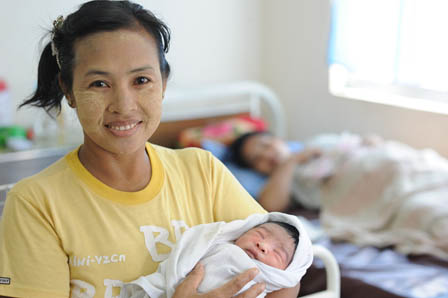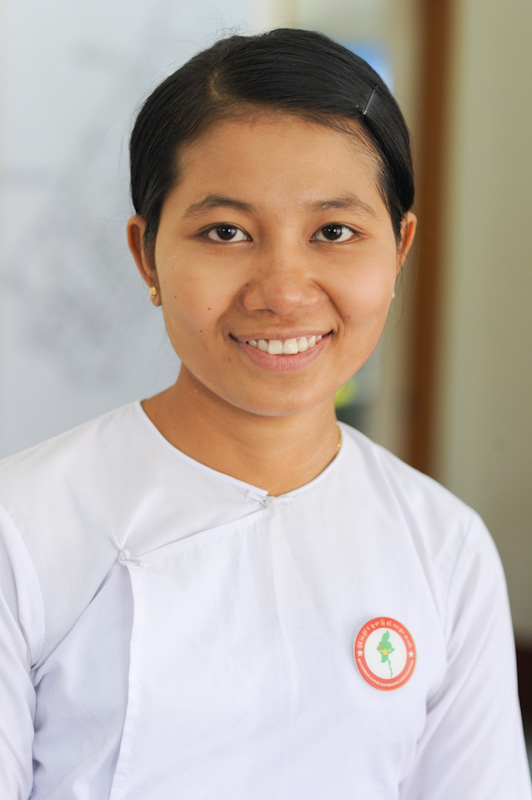Five junior midwives wearing red longyis and white hats, locally known as the “red angels” are being put through their paces through intensive training supported by the UNFPA at a maternity clinic in the outskirts of the Myanmar capital, Yangon. Their task is to prepare their team of mobile midwives to return to field – carrying out life-saving work in the numerous Internally Displaced Persons (IDP) camps in Sittwe and Myebon townships, located in central Western Myanmar.
The “red angels” were initially deployed to the camps in February, but were evacuated shortly after because of ongoing unrest in the area at the end of March. Preparing for their return, the midwives were getting intensive training while looking after new moms and babies born on 1 May at the Myanmar Nurses and Midwife Association (MNMA) South Dagon clinic. UNFPA is contributing US$207,514 yearly to help train and deploy newly graduated midwives to areas most needed.
The practical training covers antenatal, delivery and post natal care, emergency obstetric care, family planning, post-abortion care, prevention of mother to child transmission of HIV, minimum initial service package (MISP) for reproductive health in crisis situations and gender-based violence.
Ma Thae Ei Phyu, a 23 year-old midwife graduated as a midwife in May 2012 and is one of a team of 40 UNFPA supported midwives. After graduation she was deployed for the first time to Rakhine State as part of the Myanmar Nurses and Midwife Association programme. For the past two weeks she has been receiving training at the clinic. “I have learned how to assist the mothers and what the potential risks are during the first, second and third stages of delivery. From the practical part of the training, I understand more, such as if there are complications during or after the birth such as bleeding, so I can refer the mothers to the hospital,” she said. “I have learned how to go in and turn the baby during labour if the baby is positioned wrongly. For post natal care, I can guide the mothers with tips for breastfeeding and check the uterus for changes in size after delivery, known as post uterine involution.”

When stationed in Rakhine State, Ma Thae Ei Phyu often had to go to the different camps to administer antenatal care to pregnant mothers, such as pregnancy check-ups, checking blood pressure, giving health education lessons, information on personal hygiene, immunization and what to expect prior to labour. “For instance if a mother is going to deliver her baby at home, they need to prepare a clean space and birthing kit, collect cloth nappies, including ensuring that the delivery is done as sanitized as possibly. If they mothers are not safe to deliver at home, I step in and refer them to a hospital. I also teach them about basic health care and family planning,” she said.

Ma San Mu, 36 year old and already mother of three children (2 boys and 1 girl) gave birth in the early hours of 1 May (4:33 am) to a healthy baby boy weighing 3.3 kilograms. Her first two children were born at home and living more than one hour drive away in a poverty stricken area of Yangon, she decided to have the latest member of the family at the maternity clinic. “I felt it was much safer for me to deliver the baby in the clinic. My age also played a factor in case there would be complications connected to the birth. My third child was also born right here in the clinic and I was very happy with the service I received also this time around,” she said. The name of her new born baby boy has not yet been decided.
On a monthly basis the South Dagon MNMA maternity clinic assist with the delivery of 30-50 babies. Every Saturday, approximately 50 to 70 mothers receive ante-natal treatment and medical check-ups at the maternity clinic.
First time mother of a healthy yet to be named baby boy weighing 3.2 kilo born on 30 April at 5:55 am, Ma Moe Moe, 23 year old, also decided against having a home birth. “It was safer for me to have the baby here in the clinic. Many still prefer to give birth at home. The midwife was very helpful and told me about what to expect during the birth, as well as how to take care of the baby, advise on breastfeeding, changing nappies (diapers), how to hold the baby and other practical ante-natal information,” she said.
In addition to supporting with training of Myanmar midwives and health staff on reproductive health services and basic emergency obstetric care, UNFPA also assists with the upgrading of maternity wards and clinics in health facilities, including providing medical equipment.


